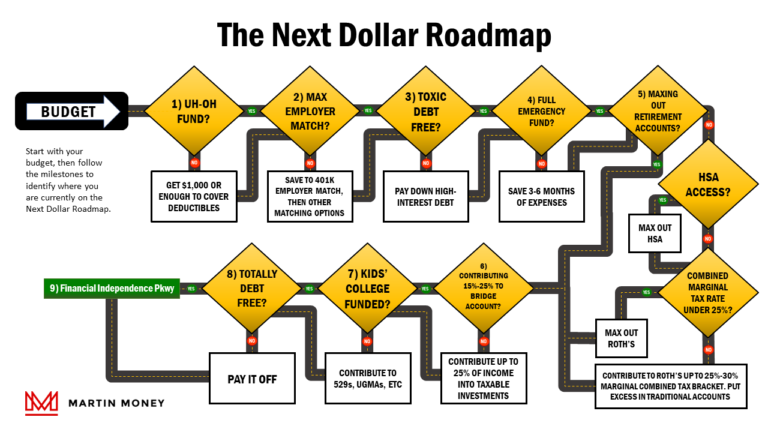How To Calculate Net Worth & Average Net Worth by Age
Knowing your net worth is a key way to measure your financial progress and success. It’s also a really simple calculation. You simply add up all of your assets and subtract any debts to arrive at your total net worth.
So, how are you doing financially?
It’s a simple question, but the answer depends on a variety of things.
Do you mean, how’s my income?
Am I driving a nice car?
Do I have much debt?
Is my savings account flush with cash?
Thinking through a question like this will invariably lead one to ponder exactly how they do want to measure their financial health.
I like to think of financial health similarly to how I view my physical health.
Think about every time you go to the doctor. Doesn’t someone normally run through the same basic steps when you arrive: check your weight, your blood pressure, your temperature, any allergies? Any medications? Etc. etc.
It may seem redundant, but I’m sure you’ll agree that it’s also probably a worthwhile practice.
After all, how can the doctor make any assumptions about changes to your health if he or she doesn’t have some historic baseline to reference?
Financially, there are a few “vitals” that can also provide some quick feedback about how well we are.
Some examples include debt, income, physical assets, liquid assets, cash flow, spending habits, and what I feel is the most important measure, net worth.
What is Net Worth?
According to Investopedia, Net Worth is the value of the assets a person or corporation owns, minus the liabilities they owe.
In plain English, net worth is how much cash would be left if you sold everything you had and paid off all your debts.
In my humble opinion, there isn’t a more important measure of overall financial health.
The reason is most of the vitals we previously mentioned only give a partial view, while net worth tells the whole story.
For example, it’s possible to have an annual income well into 6-figure territory and have a negative net worth due to unhinged spending and burdensome debt. (I won’t pick on professional athletes here, but they provide numerous examples.)
On the other hand, it’s also entirely possible to have zero income, yet enjoy wealth into the millions based on one’s assets and lack of debt.
Which would you rather be? W-2 rich with no net worth or W-2 poor with millions in the bank?
And that’s just part of the story. Generally, when we make assumptions about someone’s wealth, we base it on what we can see.
Factors like the home they live in, the cars they drive, or the vacation destinations they visit all serve as data points for some very shaky assumptions about their riches (or lack thereof).
In summary, net worth is the measure that cuts through all that minutia and provides an accurate report of wealth.
Even after you know where you are on the Next Dollar Roadmap, Net worth is how you score your financial progress.
How is Net Worth Measured?
If you can add and subtract, I have good news.
You can calculate your net worth.
Assets
Simply add up the total value of all your assets and possessions. There’s a point where the actual dollar value of an asset gets so low you’ll stop caring, but you might include some of the following:
- Cash (in checking, savings, your wallet, under your mattress, etc.)
- Investment assets (stocks, bonds, ETFs, Money Markets, 401(k)s, IRAs, etc.)
- Your home
- Pensions (If you have any that are guaranteed)
- Your cars (if you want)
- Anything else of significant value that you care to account for
Personally, we don’t factor anything beyond the first four bullets for two reasons:
1) we don’t have anything valuable enough to bother counting that we’d sell, and;
2) it can be difficult to assign an accurate value to most material possessions anyway.
The total sum of all of these assets is known as your total assets. I know it’s a revolutionary term, but try to stay with me.
Liabilities
Next, add up all of your outstanding debts. Hopefully, this is something you already have a pretty good idea about because you don’t have many or you’re working hard to get rid of them.
Be sure to get everything: student loans, mortgages, HELOCs, credit cards, all of it. The more thorough you are, the more accurate the final tally will be.
Equity
Equity is basically your net worth, but it’s commonly used in the vernacular with assets and liabilities. I’m sure you accountants out there are pleased as punch.
Boiling all this down, the formula for net worth is absurdly simple:
Assets – Debts = Net Worth
It’s a good thing too because it’s something everyone should keep up with.
Personally, I use an Excel spreadsheet that automatically updates my net worth every time I update my cash and investment position, but once a year is probably good enough.
Update your own numbers as often as you wish, but I’d also record the result so you can measure future progress against it.
It’s fun to look back and see how far you’ve come. Plus, it can provide an incentive to remain disciplined going forward.
What Should my Net Worth Be?
A very common question that follows “how to calculate net worth?” is “how does my net worth compare to my peers?”
For your logical consideration, we’ve included a table below illustrating average and median net worths for a range of ages.
This data was provided by the Federal Reserve after their 2019 Survey of Consumer Finances. (https://www.federalreserve.gov/econres/scfindex.htm) The Federal Reserve Bank conducts this survey every three years.
The 2022 results will be published in early 2023.
Net worth by age:
Age | Median Net Worth | Average Net Worth |
Less than 35 | $13,900 | $76,300 |
35-44 | $91,300 | $436,200 |
45-54 | $168,600 | $833,200 |
55-64 | $212,500 | $1,175,900 |
65-74 | $266,400 | $1,217,700 |
75+ | $254,800 | $977,600 |
Not to toss any cold water over your head if you are above average for your age bracket, but the average American is not on pace for an abundant retirement.
Don’t let this table take away your hunger for achievement. After all, it’s a lot easier to retire with too much than not enough. Amiright?
Another item of note from this table is the broad gap that must exist between the wealthiest of Americans and, well, those that aren’t.
As a reminder, the median net worth is represented by the person with exactly the same number of people with less and more net worth than him or her.
The average, of course, is measured as if all wealth is tossed into the same bucket and divided by the number of people in the group.
Clearly, there must be some very wealthy people who drastically pull the averages up almost five-fold over the median for all of these age groups. This is why I prefer to include median data in this type of table.
Another variable we thought you might be interested in is education level. See the table below for this data.
Net worth by education level:
Education Level | Median Net Worth | Average Net Worth |
No High School Diploma | $20,500 | $137,800 |
High School Diploma | $74,000 | $305,200 |
Some College | $88,800 | $376,400 |
College Degree | $302,200 | $1,519,900 |
Stay in school kids.
And if you go to college, you might as well see it through to the end.
I realize this data probably isn’t very surprising, but it does a great job of making a convincing case to obtain a secondary education.
Net worth by state:
State | Median Net Worth |
Alabama | $85,900 |
Alaska | ? |
Arizona | $126,100 |
Arkansas | $49,990 |
California | $200,300 |
Colorado | $217,900 |
Connecticut | $173,500 |
Delaware | $143,700 |
District of Columbia | $24,000 |
Florida | $95,770 |
Georgia | $110,000 |
Hawaii | $373,200 |
Idaho | $182,400 |
Illinois | $103,500 |
Indiana | $84,620 |
Iowa | $152,800 |
Kansas | $77,010 |
Kentucky | $73,150 |
Louisiana | $84,850 |
Maine | $107,400 |
Maryland | $194,700 |
Massachusetts | $251,000 |
Michigan | $117,600 |
Minnesota | $228,500 |
Mississippi | $40,280 |
Missouri | $70,220 |
Montana | $190,300 |
Nebraska | $99,520 |
Nevada | $93,920 |
New Hampshire | $243,600 |
New Jersey | $195,200 |
New Mexico | $56,450 |
New York | $123,900 |
North Carolina | $108,400 |
North Dakota | $241,000 |
Ohio | $102,800 |
Oklahoma | $80,790 |
Oregon | $183,200 |
Pennsylvania | $137,800 |
Rhode Island | $83,790 |
South Carolina | $81,150 |
South Dakota | $216,600 |
Tennessee | $70,100 |
Texas | $90,390 |
Utah | $170,900 |
Vermont | ? |
Virginia | $148,400 |
Washington | $170,400 |
West Virginia | $65,920 |
Wisconsin | $110,400 |
Wyoming | $171,600 |
What is going on in D.C.? That was very unexpected; not that I’m very familiar with economics there.
I’m assuming most of the higher net worth states are also states where real estate values tend to be higher, but there are a couple of outliers.
Here’s lookin’ at you Montana and the Dakotas.
What Net Worth is Considered Wealthy in 2023?
According to Charles Schwab’s Modern Wealth Survey, Americans believe a net worth of $2.2 million is considered “wealthy.
That’s a lot of money, but you can’t reach $2.2MM if you don’t get to $1MM first.
That’s Great Info, But How Much do I NEED?
It’s helpful to have data points about the greater population, but none of that’s very relevant unless you’re aiming for an average retirement.
To really gauge your progress you need to know where you stand relative to your goals. Since your goals are unique to you, this makes the process of locating an accurate number a little more complicated.
In the personal finance world, the amount of cumulative wealth any given person needs in order to provide the retirement lifestyle they desire is known as their “number”.
We have a few options for you to consider as you set out to identify your “number”, but we’d like to point out that you really need a solid estimate of what your retirement expenses will be in order to predict the net worth to fund it.
The younger you are, the harder that will be to do.
Nevertheless, even though these tools can give you an idea, you will eventually need an accurate spending forecast in order to properly stress test your retirement plans.
Fidelity
Fidelity is one of the better low-cost investment banks out there. Though we don’t currently have any accounts with Fidelity, Curt had a 401(k) and HSA with a previous employer that was managed by Fidelity. It was a good experience.
Fidelity is known for publishing a scale to estimate how much you should have saved for retirement based on your current age.
In summary, beginning at age 30 Fidelity suggests 1x your current income in retirement savings is a sufficient milestone. Here are the rest of the milestones up to age 67.
Age | Retirement Savings as a multiple of Annual Income |
30 | 1x |
35 | 2x |
40 | 3x |
45 | 4x |
50 | 6x |
55 | 7x |
60 | 8x |
67 | 10x |
Honestly, I have no idea how they came up with this, but if viewed in its proper perspective (as a rule of thumb and not an accurate directive) I suppose it’s okay to use.
I’ll give my opinion since it’s my blog. I think this is a little low.
The 25x rule
Another very popular rule of thumb is the 25x rule. Basically, the 25x rule assumes that in retirement you have at least 25x of your annual retirement expenses in your portfolio.
Note, it is 25x expenses, not 25x your pre-retirement income.
In truth, it should probably be called the 4% rule since that’s what it was known as by the guy who invented it.
The brainchild of financial specialist Bill Bengen, the 4% rule was the product of in-depth research of actual stock returns and retirement scenarios over the past 75 years (well, preceding 1994).
The results showed that if retirees withdrew no more than 4.2% of their assets each year in retirement, they stood an excellent chance of never running out of money.
Since 25x is easier to grasp than 4% (1/25th), I guess it was renamed.
This too is a good rule of thumb. Will it work for you? Depends on what your goals are.
Bear in mind, the study assumes that 25x is achieved at retirement age. If you’ve got dreams of FIRE, you’ll need to drop that withdrawal rate down to around 3% and call it the 33 & 1/3rdx rule.
FIREcalc
If accuracy is what you want, have I got an app for you?
FIRECalc is a Monte Carlo simulator that allows you to enter various data points and run them against historical market conditions to produce a likelihood of success for the future.
While the past is no guarantee of future success, running a century’s worth of scenarios is about as good of a method as you’ll find for stress testing your retirement plans.
In fact, if you go to any decent CFP and ask them how much you need to retire, they’re going to run a Monte Carlo simulation based on the information you give them.
If they don’t, you need to get your money back and go see another CFP.
Again, the more accurate your inputs, the more applicable the output will be. Gather information about your retirement income, retirement savings, expected social security, any pensions, and expected expenses, and have a ball.
FIRECalc is my go-to for pinpointing my number. Personally, I ran scenarios until I found one in which I would have been 100% successful at every point in history that FIRECalc has recorded.
And that’s my “number”.
100% successful history is overkill, but if you aim for the stars you’re more likely to hit the moon than to go nowhere at all.
The app is free, but you can make a donation to the owners of the program if you so desire.
It would cost you $3,000-$5,000 to go to a fee-based financial planner and have them run one for you (among other services), so FIRECalc clearly provides significant value for users.
Conclusion
Once again, we hope you found all of this information helpful. Now go be a net worth champion!







